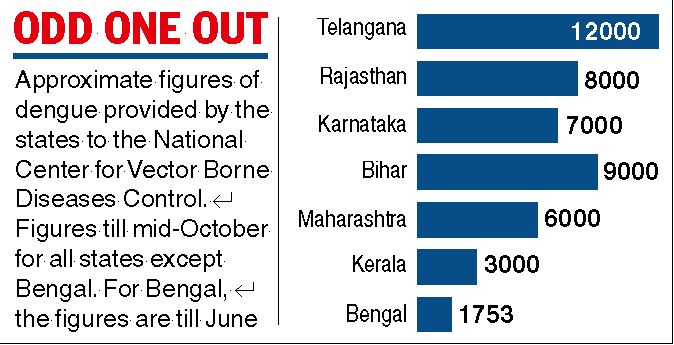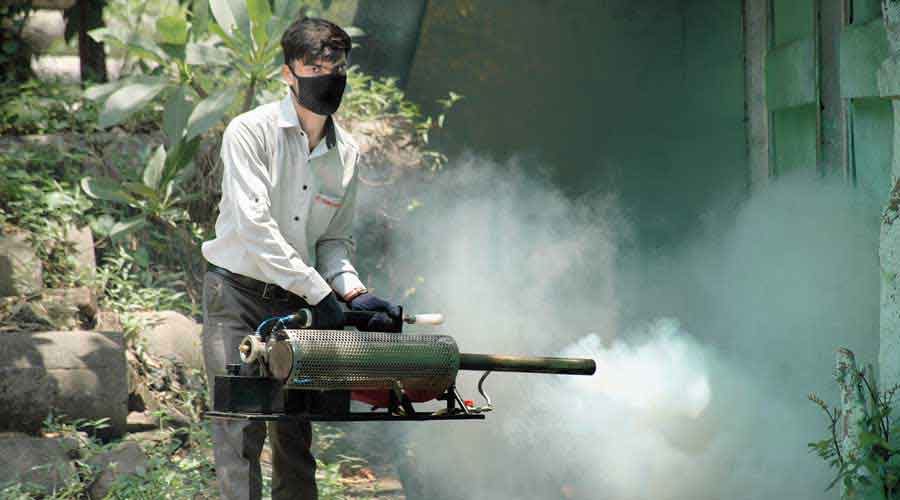The Bengal government is not releasing figures on dengue deaths or the exact area-wise demarcation of zones reporting the maximum number of cases, ostensibly to avoid panic.
However, several public health experts contested the purported justification, saying clear communication would be far better to fight a public health scare than the suppression of basic information.
The National Center for Vector Borne Diseases Control under the Union health ministry has not received any data regarding dengue from Bengal during the high transmission season, sources at the institute in Delhi said.
“We are receiving data about dengue infections and deaths from most states. But the Bengal government has given data only till June this year. There is no data available to us from the state on dengue for the high transmission season,” said a senior official at the control centre.

The official said states like Telangana, Rajasthan, Kerala, Karnataka and Bihar had updated information on fresh dengue cases and deaths till the middle of October. Bengal has reported to the central institute only 1,753 cases and three deaths till June.
“Our expert teams are visiting the areas from where a high number of cases are being reported and providing guidance to the state governments and civic bodies about proper protocol of vector control,” said the official.
Asked why the Bengal government was not releasing data about the number of dengue deaths this year and the area-wise distribution of cases, an official of the state health department said they were “reviewing the deaths”.
“There are a lot of factors like co-morbidities that have to be taken into account before we can say a death has happened due to dengue,” said the senior health department official.
Another senior official of the department said they were not publishing the data of area-wise cases of dengue because this could lead to “unnecessary panic”.
Many public health experts said the reasoning was “flawed”.
“If the data is not released, how do people know they are at risk? This creates a false sense of complacency,” said an expert at the National Center for Vector Borne Diseases Control. “Precaution is the key to preventing transmission in areas where there is a high prevalence of dengue cases. There is no treatment for dengue and prevention is the only way to contain it. The community has the right to know what is happening in their neighbourhood,” the Delhi-based expert said.
A public health expert who has been involved in the Bengal government’s fight against Covid also underscored the need for transparency on dengue.
“In case of Covid, too, there was panic initially when figures of fresh infections and deaths were published. But after that, people became aware and many started taking precautions,” said the expert. He said because of a Supreme Court directive, the governments were bound to release updates on Covid.
“In Bengal, district-wise data was available (for Covid) and that helped in effectively fighting the pandemic. Dengue cannot be compared with the Covid pandemic in any way but similar dissemination of information by civic bodies can be of great help in containing it,” he said.
According to him, Singapore has an app that provides information about the areas where dengue is more prevalent. This way, people can take precautions while going to those areas.
“In case of Covid, there was a lot of community involvement. Local representatives, MLAs, councillors and panchayat members were coming forward for awareness drives. In case of dengue, they are not visible,” the expert said.
However, there is also a section in Calcutta that feels publishing data on dengue could lead to “unnecessary panic and pressure on the city’s health infrastructure”.
“Like in Covid, there could be many who would seek admission at hospitals when they can well be treated at home. This way, the hospital beds will be unnecessarily filled up,” said Chandramouli Bhattacharya, infectious diseases expert at Peerless Hospital.











